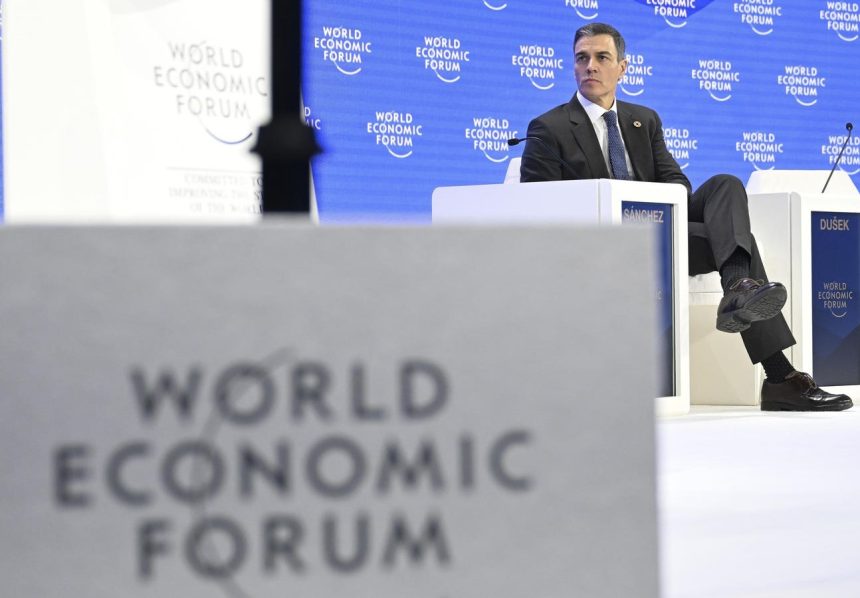Spanish Prime Minister Pedro Sánchez’s address at the World Economic Forum in Davos, Switzerland, raised a critical alarm about the insidious threat social media poses to global democracies. He argued that these platforms, initially designed to connect and liberate, have been weaponized by powerful elites, particularly tech billionaires, to manipulate public discourse and advance their own agendas. Sánchez characterized this phenomenon as a form of technological oppression, where the promise of unity and democratic dialogue has been replaced by division, manipulation, and the propagation of reactionary ideologies. He underscored the inherent danger of concentrated power in the hands of the wealthy elite, who, he argued, exploit social media to circumvent democratic processes and impose their will on the masses. This concern, while voiced by others before, carries added weight coming on the heels of prominent tech billionaires’ presence at political events, raising questions about their influence on policy and governance.
Sánchez’s concerns resonate with a growing chorus of experts and analysts who recognize the double-edged nature of social media. While acknowledging the platforms’ positive contributions to business, connectivity, and social movements like #MeToo, they warn of the equally potent downsides. The algorithms that drive these platforms, designed to maximize engagement, have inadvertently created echo chambers where extreme views are amplified, contributing to polarization and self-radicalization. This polarization, fueled by the constant churn of outrage and misinformation, erodes the foundations of democratic discourse, making compromise and consensus-building increasingly difficult. Furthermore, the vast reach and influence of these platforms enable the rapid spread of disinformation, often unchecked by effective fact-checking mechanisms, further undermining public trust in institutions and information sources.
The very structure of social media platforms, where a handful of powerful companies control the flow of information, exacerbates the threat to democracy. This centralized power allows for the manipulation of algorithms to prioritize certain narratives while suppressing others. The ability of these platforms to silence dissenting voices, coupled with the decline of independent fact-checking, creates an environment where misinformation can flourish and where the boundaries of acceptable discourse are increasingly defined by corporate interests. This raises concerns about monopolistic practices and the potential for censorship, effectively transforming these platforms into gatekeepers of information with the power to shape public opinion and influence political outcomes. The lack of transparency in how these algorithms operate further complicates the issue, making it difficult to understand the extent of their influence and hold these companies accountable.
The problem is further compounded by the presence of actors hostile to democratic values on these very platforms. The tolerance of extremist accounts, including those linked to foreign adversaries and known terrorist organizations, raises serious questions about the commitment of social media companies to combating the spread of harmful ideologies. The reported instances of allowing paid verification for such accounts underscore the prioritization of profit over democratic principles, potentially providing legitimacy and reach to dangerous actors. This not only amplifies their message but also contributes to the normalization of extremist views, further eroding public trust and fueling societal divisions. The intertwining of financial incentives with the dissemination of potentially harmful content creates a complex dilemma where the very mechanisms that drive platform growth are also contributing to the erosion of democratic values.
Addressing this complex challenge requires a multi-pronged approach. Exposing the role of foreign influence and the flow of funding that supports the spread of disinformation is crucial. Understanding how these external forces manipulate the online discourse is essential to developing effective countermeasures. Furthermore, greater scrutiny of the conflicts of interest between governments, social media companies, and the various interest groups operating within these platforms is necessary. Transparency in algorithms and content moderation policies is also vital to ensuring accountability and preventing the manipulation of public discourse. However, navigating these issues requires careful consideration of free speech principles, a challenge particularly salient in democracies where restrictions on expression are met with strong resistance.
The apparent apathy of many governments outside of China to the seriousness of this threat is particularly alarming. This lack of recognition allows the problem to fester and provides fertile ground for further manipulation and erosion of democratic norms. While the commitment to free speech complicates regulatory efforts, particularly in the United States, it is crucial to find a balance between protecting freedom of expression and mitigating the harms posed by the unchecked spread of misinformation and manipulation. The urgency of this challenge demands a concerted effort from governments, civil society organizations, and tech companies themselves to develop effective strategies for safeguarding democratic values in the digital age. Failure to act decisively risks further empowering those who seek to undermine democracy and exploit the very tools designed to connect and empower individuals.



